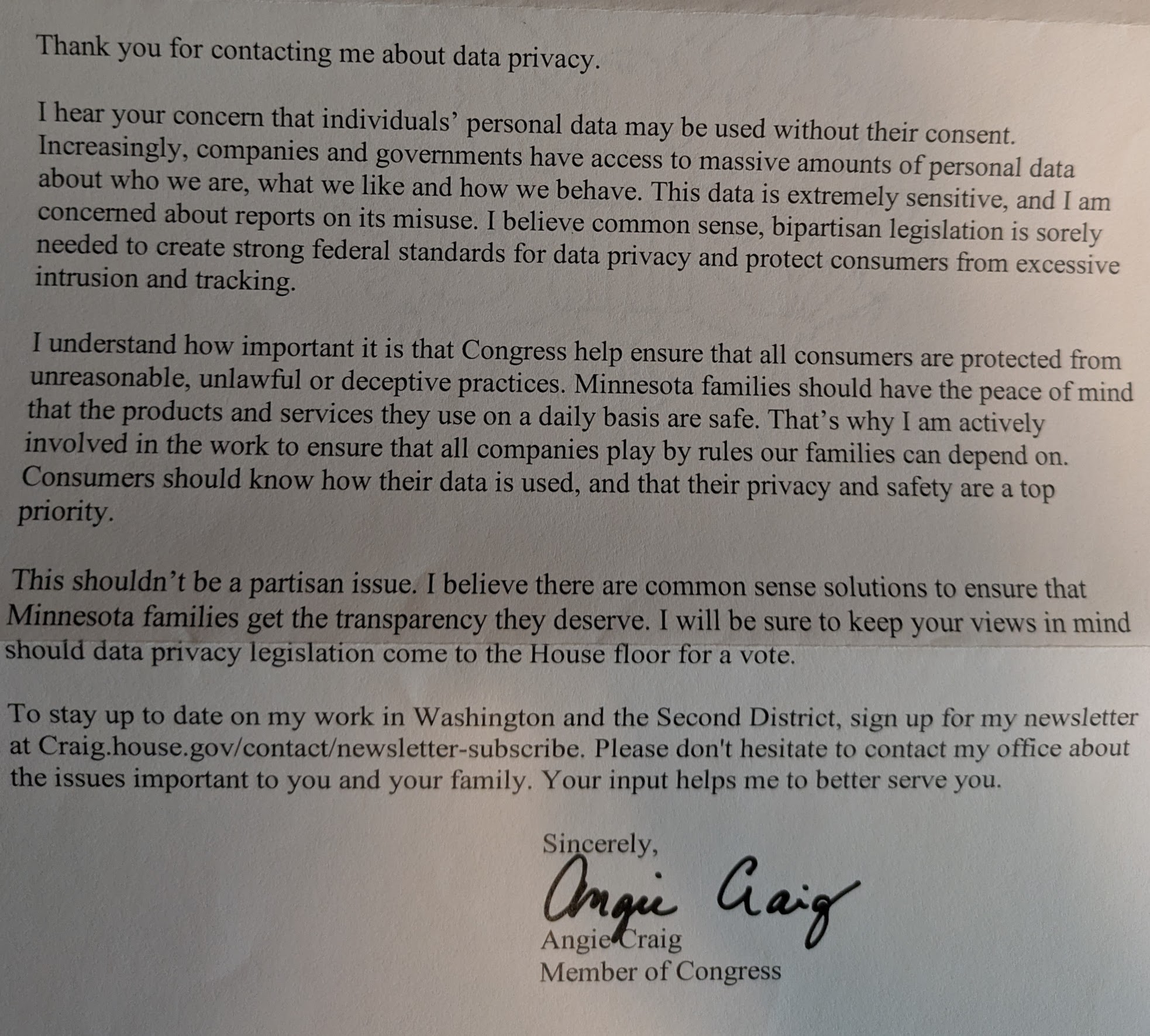There are real problems that could be addressed by new legislation. Along with ubiquitous cell phone cameras and deep fake abilities have come a rash of gross online behavior; what we might have once referred to as revenge porn is now collectively referred to as non-consensual intimate imagery (NCII).
The U.S. Senate recently passed the TAKE IT DOWN Act to address the problem. The intention is good. However, the proposed implmentation leaves much to be desired - so much so that Trump excitedly referenced wanting to use the bill to silence his past accusers during last week’s address to the joint session of Congress.
I sent letters to my Congressional representation voicing my concerns. The letter to Senator Amy Klobuchar, co-sponsor of the bill, is below.
Subject: Opposition to the Take It Down Act (S.146)
Dear Senator Klobuchar,
I am writing to express my strong opposition to the Take It Down Act, which recently passed the Senate and you co-sponsored. While the bill’s stated intent- to combat non-consensual intimate imagery (NCII) - is laudable, its approach is deeply flawed. As drafted, the bill creates an overbroad notice-and-takedown system with severe penalties, incentivizing platforms to remove content without meaningful review. This will not only result in abuse but will actively suppress lawful speech.
This has happened before: The Digital Millennium Copyright Act (DMCA) was designed to protect intellectual property, but its notice-and-takedown provisions have been repeatedly weaponized. Tens of thousands of fraudulent DMCA claims have been used to silence journalists, suppress negative press, and manipulate online discourse. The Take It Down Act creates a nearly identical system, except instead of copyright claims, it enables virtually any powerful individual or institution to demand the removal of speech they dislike under the guise of NCII complaints.
The chilling effect is obvious. Faced with a 48-hour takedown mandate and the threat of legal or financial penalty, platforms will opt to remove content immediately, even when claims are unfounded. This will disproportionately impact:
- Survivors of abuse who use online platforms to expose their abusers - This law will provide bad actors with a new tool to erase evidence of their misconduct.
- Journalists and activists documenting abuses of power - From war crimes to workplace harassment, critical reporting could be wiped from public view with a mere takedown request.
- Platforms already struggling to moderate content responsibly - The law forces them to err further on the side of mass removal, leading to default state of over-censorship.
Even more concerning, President Trump has openly admitted that he intends to use this law for his own benefit. In this year’s joint address to Congress, he stated, “And I’m going to use that bill for myself too if you don’t mind, because nobody gets treated worse than I do online, nobody.” We should work to thwart totalitarian tendencies during these unprecedented times, not further encourage them.
There are better ways to combat NCII. The National Center for Missing & Exploited Children (NCMEC) has already developed a voluntary, hashed-based system to help platforms identify and remove problematic content without requiring rushed, legally fraught decisions. Similarly, StopNCII.org has developed a robust, privacy-protecting approach that allows individuals to preemptively flag sensitive content for removal without government intervention. Groups like Federated Trust and Safety (IFTAS) have compelling solutions but are struggling for support to continue their work. Strengthening these initiatives through funding or platform incentives would be far more effective than mandating a sweeping, abuse-prone legal regime.
For these reasons, I urge you to revisit your support for the Take It Down Act, work on these gaps should the opportunity arise during reconciliation, and support solutions that address the real problem without undermining fundamental freedoms.
Sincerely,
Matthew Reinbold
Update 2025-03-30
I’ve heard from several recipients, including Senator Tina Smith. She has announced that she won’t seek re-election when her term ends in 2026. However, despite her time in the Senate ending, she has continued to be personal, responsive, and articulate on the issues I’ve contacted her about.
Representative Angie Craig, however, is another matter. Considering she has spoken in favor of the Take It Down Act, I didn’t know what to expect writing her. However, I would have had more respect for silence than the oddly phrased, generic “protecting personal data” letter I received. I understand these are busy people and I wouldn’t expect a personalized “F-U” from a bill supporter. But printing and mailing “default data pearl-clutching response #7” from the stack just makes her (and/or her staff) look that much more out of touch with the current moment.

Sigh.
Update 2025-04-28
As mentioned by the EFF, the U.S. House of Representatives today passed the Take It Down act. It now moves on to be signed into law by the President.
Update 2025-05-15
It has been weeks but I have yet to see confirmation that this has been signed. Odd.
Update 2025-05-19
Today, Monday the 19th, Trump signed the Take It Down Act into law.
“The law makes publishing NCII, whether real or AI-generated, criminally punishable by up to three years in prison, plus fines. It also requires social media platforms to have processes to remove NCII within 48 hours of being notified and ‘make reasonable efforts’ to remove any copies. The Federal Trade Commission is tasked with enforcing the law, and companies have a year to comply.”
The Internet Federated Trust and Safety Group (or IFTAS) released guidance for online moderators on how to approach their new responsibilities under the law. This isn’t just a concern for the Instasnaps and Facetubes of the world - even moderators of individual Mastodon instances are potentially liable, as the law applies to “any online service that allows users to share or distribute user-generated content,” regardless of size or commercial status.




